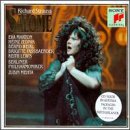| All Artists: Victor von Halem, Keith Lewis, Karl Markus, Peter Maus Title: Salome Members Wishing: 0 Total Copies: 0 Label: Sony Original Release Date: 1/1/1991 Re-Release Date: 9/26/1991 Genre: Classical Style: Opera & Classical Vocal Number of Discs: 2 SwapaCD Credits: 2 UPCs: 074644671728, 5099704671727 |
Search - Victor von Halem, Keith Lewis, Karl Markus :: Salome
 | Victor von Halem, Keith Lewis, Karl Markus Salome Genre: Classical
|
Larger Image |
CD DetailsSimilar CDs |
CD ReviewsMarton fans will be pleased... Daniel Mitrano | Ft. Lauderdale, FL | 12/11/1999 (4 out of 5 stars) "Okay, so Eva Marton doesn't sound like a sixteen year old, but in this role who does? Certainly Nilsson, Varnay, Rysanek, Golz, Norman, Caballe, and Borkh didn't. Malfitano and Stratas came close, but the Isolde-esque writing severely taxed them. Behrens came even closer. Studer was the only one who really sounded young and could sing the part without strain, but her colorless voice impeded enjoyment and her supporting cast was woefully inadequate. At least here, Marton sings the part at full throttle giving the listener plenty of lush, beautiful vocalism. She's not as exciting as Nilsson, but I think Mehta gives us a better impression of the opera's musical possibilities than Solti did. The rest of the cast is pretty good too. Zednik gives us the same neurotic singing as he did for his Mime, but it works. Fassbaender takes easily to the role of a nagging fishwife, but the voice is well past its prime and has some ungainly moments. Weikl's dry baritone conveys the necessary grandeur if not ideal steadiness. The rest of the cast remains merely adequate. The engineering is oddly dim and not evenly balanced for a studio performance--I can accept that in a live performance but not in a studio recording. Marton fans will love this set." Mehta weaves orchestral magic! Suddhaseel Sen | 09/22/2009 (5 out of 5 stars) "It is unfortunate that this item has been discontinued by the manufacturer. Hopefully, the recording will be issued soon. Till then those who are interested should find it on special order at Arkiv music.
I have four favorite versions of this opera. The one by Clemens Krauss has the most natural sense of line and forward momentum, and although neither Christel Goltz (Salome) nor Julius Patzak (Herod) have the most beautiful of voices, they are admirably dramatic. Patzak, in fact, "acts" the role better than any other singer I have heard in this role. Herbert von Karajan's recording has the mellifluous voice of Hildegard Behrens, the most vocally beautiful Salome of all, but the recording as a whole plays down the Expressionist elements of the score. If you think of "Salome" as a fin de siècle work, this may be the version for you. Giuseppe Sinopoli's audio version brings the best balance between vocal singing (Studer) and orchestral performance. Where does Mehta's version fit in? Although I have admired some of Eva Marton's recordings, her "Salome" is not one of her best. On the other hand, some of the other singers are VERY fine indeed, especially Brigitte Fassbaender (Herodias) and Keith Lewis (Narraboth): Lewis shows that Strauss could write very well for tenors, despite his well-known dislike of the voice type! However, the greatest strength of this recording lies in the orchestral performance. Mehta is unerringly sensitive to the style of the music - how the score looks back to Wagner and the fin de siècle while, at the same time, looks forward to the Expressionist world of Schoenberg (and Strauss's own "Elektra"). In addition, Mehta achieves a fine balance between clarity of detail, forward momentum, and dramatic strength. Hear, for example, the slithering viola line (a few seconds into the beginning) which is as clear as the sharply-etched winds and brass (and the chorus) playing/singing simultaneously, the terrifyingly pianissimo brass writing a few seconds before Salome asks for Jochanaan's head, or the cathartic dissonance (F/F#) at the end of Salome's closing scene. This recording is of the best modern orchestral performance of the score, and while there may be better vocal recordings elsewhere, many of the singers here ARE very good. Moreover, this is Strauss's most "orchestral" opera (Fauré called it a tone poem with added voice parts), and Mehta shows better than any other conductor how colorful and powerful the orchestral writing is! The Berlin Philharmonic is on terrific form in its only complete recording of the opera so far, and had the quality of the singing been uniformly good, I would have placed this recording at the same level as Mehta's celebrated '72 recording of Puccini's "Turandot."" |

 Track Listings (15) - Disc #1
Track Listings (15) - Disc #1
